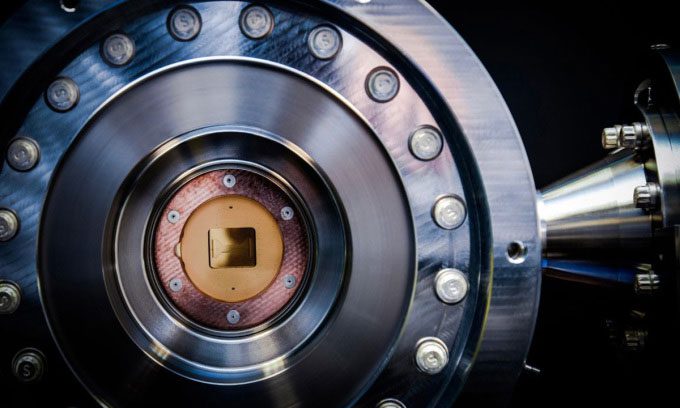The H2-1 quantum computer has set a new world record for “quantum supremacy,” outperforming Google’s Sycamore quantum computer by approximately 100 times.
A team of scientists at the American quantum computing company Quantinuum conducted several tests to evaluate the performance of the H2-1, a new quantum computer integrated with 56 qubits, and the quality of the qubits used, as reported by Live Science on July 11. The research results were published on the arXiv database.

Quantinuum’s quantum computer. (Photo: Quantinuum).
Quantum computers can perform multiple calculations in parallel due to the laws of quantum mechanics and the entanglement between qubits, while traditional computers can only operate sequentially. Adding more qubits to a system exponentially increases the computer’s power. Scientists predict that in the future, quantum computers will be able to complete complex calculations in just a few seconds, a task that would take traditional supercomputers thousands of years.
The point at which quantum computers surpass traditional computers is referred to as quantum supremacy, but to achieve this milestone in a practical way, quantum computers need millions of qubits. Currently, the largest machines have around 1,000 qubits. The reason such a massive number of qubits is necessary for quantum supremacy is that they are inherently prone to errors, necessitating many qubits to correct those errors. Currently, many researchers are focusing on developing more reliable qubits rather than just increasing their quantity.
In the new study, the team of experts tested the output data accuracy of H2-1 using the Linear Cross Entropy Benchmark (XEB). XEB yields results ranging from 0 (all outputs are erroneous) to 1 (completely error-free).
Google was the first to test the Sycamore quantum computer using XEB in 2019, demonstrating that it could complete a calculation in 200 seconds that the strongest supercomputer at the time would require 10,000 years to finish. They recorded an XEB score of approximately 0.002 with 53 integrated superconducting qubits in Sycamore.
In the new research, scientists from Quantinuum and JPMorgan, California Institute of Technology (Caltech), and Argonne National Laboratory reported an XEB score of approximately 0.35. This means that the H2-1 quantum computer with 56 qubits produces results with no errors 35% of the time.
“35% is a significant step towards the ultimate accuracy limit of 100% – the ideal level,” Quantinuum stated. Additionally, the new quantum computer operates algorithms with energy consumption that is less than 30,000 times that of traditional computers.





















































